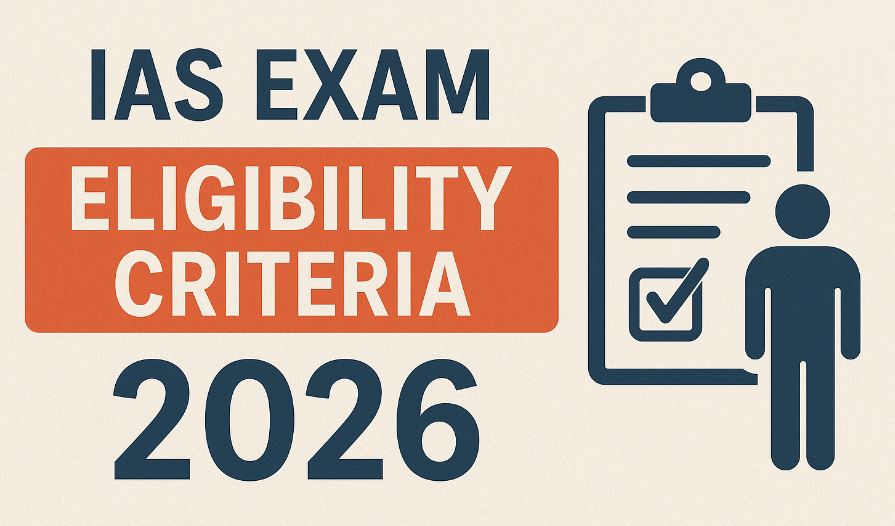Are you dreaming of becoming an Indian Administrative Service (IAS) officer through the UPSC Civil Services Examination (CSE) in 2026? The IAS exam is one of the most prestigious and challenging exams in India, attracting lakhs of aspirants every year. But before you dive into preparation, understanding the eligibility criteria is crucial to ensure you’re on the right track. In this comprehensive guide, we’ll cover the full IAS exam eligibility criteria for 2026, including age limits, educational qualifications, nationality requirements, number of attempts, and more. This post is tailored for students preparing for the 2026 exam, with the latest updates based on official UPSC guidelines.
Whether you’re a fresh graduate or a working professional, knowing these details will help you plan your strategy effectively. Let’s break it down step by step. Note that the official UPSC CSE 2026 notification is expected to be released on January 14, 2026, but the eligibility criteria typically remain consistent with previous years unless specified otherwise.
Nationality Requirements for IAS Exam 2026
The nationality criterion is the first eligibility checkpoint for the UPSC CSE. For most services, including IAS, Indian Police Service (IPS), and Indian Foreign Service (IFS), you must be an Indian citizen. However, for other central services, there is some flexibility:
- Indian Citizen: Mandatory for IAS, IPS, and IFS.
- Other Eligible Nationalities: Citizens of Nepal or Bhutan, Tibetan refugees who came to India before January 1, 1962, with the intention of permanent settlement, or persons of Indian origin who migrated from Pakistan, Burma, Sri Lanka, or East African countries (Kenya, Uganda, Tanzania, Zambia, Malawi, Zaire, Ethiopia, and Vietnam) for permanent settlement in India.
If you’re not an Indian citizen but fall into the above categories, you must provide a certificate of eligibility issued by the Government of India. Without this, you won’t be appointed even if you clear the exam.
Age Limit for IAS Exam 2026: Detailed Breakdown with Relaxations
The age limit is one of the most queried aspects of UPSC eligibility. For the 2026 exam, candidates must have attained the age of 21 years and must not have attained the age of 32 years as of August 1, 2026. This means:
- You must be born not earlier than August 2, 1994 (for the upper age limit).
- You must be born not later than August 1, 2005 (for the lower age limit).
Age is calculated based on your date of birth as recorded in your matriculation or secondary school certificate. Here’s the category-wise breakdown with relaxations:
| Category | Minimum Age | Maximum Age | Relaxation |
|---|---|---|---|
| General/EWS | 21 years | 32 years | No relaxation |
| OBC (Non-Creamy Layer) | 21 years | 35 years | 3 years |
| SC/ST | 21 years | 37 years | 5 years |
| Persons with Benchmark Disabilities (PwBD) | 21 years | 42 years | 10 years |
| Ex-Servicemen (including Commissioned Officers and ECOs/SSCOs with 5 years of service) | 21 years | 37 years | 5 years |
| PwBD + OBC | 21 years | 45 years | 13 years (10 + 3) |
| PwBD + SC/ST | 21 years | 47 years | 15 years (10 + 5) |
| Domiciled in Jammu & Kashmir (1980-1989) | 21 years | 37 years | 5 years |
Additional notes:
- Cumulative relaxations apply in some cases (e.g., SC/ST PwBD get up to 15 years).
- Ex-servicemen must have rendered at least 5 years of military service.
- If you’re claiming relaxation, ensure you have the necessary certificates ready during document verification.
This age structure ensures inclusivity while maintaining a standard for entry into civil services.
Educational Qualification for UPSC IAS 2026
To appear for the IAS exam, you need a bachelor’s degree from a recognized university. Key points:
- Minimum Qualification: A degree in any discipline from a university established by an Act of Parliament or State Legislature, or deemed universities under the UGC Act, 1956.
- Final Year Students: If you’re in your final year of graduation or awaiting results, you can apply provisionally. However, you must submit proof of passing the degree exam before the Mains stage.
- Professional Degrees: Holders of MBBS, engineering, or other professional degrees are eligible, even if they haven’t completed internships (proof required later).
- Distance Education: Degrees from open universities or distance learning (like IGNOU) are accepted if recognized by UGC/AICTE.
- No Minimum Percentage: There’s no requirement for a specific GPA or percentage in your graduation.
If your qualification is from a foreign university, it must be recognized by the Association of Indian Universities as equivalent to an Indian degree.
Number of Attempts Allowed in IAS Exam 2026
UPSC limits the number of attempts to prevent indefinite retries, but relaxations apply based on category:
| Category | Maximum Attempts |
|---|---|
| General/EWS | 6 |
| OBC | 9 |
| SC/ST | Unlimited (until age limit) |
| PwBD (General/OBC/EWS) | 9 |
| PwBD (SC/ST) | Unlimited (until age limit) |
| Ex-Servicemen | Additional 3 attempts beyond category limit |
Important:
- An attempt is counted if you appear for at least one paper in Prelims.
- If you qualify Prelims but skip Mains, it still counts as an attempt.
- Disqualified or canceled candidatures don’t count.
- Ex-servicemen and PwBD get extended attempts with age relaxations.
Track your attempts carefully, as exceeding the limit leads to disqualification.
Physical Standards and Medical Requirements
While there’s no physical test during the exam, certain services like IPS require meeting specific physical standards post-selection:
- Height: Men – 165 cm (relaxed for certain categories); Women – 150 cm.
- Chest Girth: Men – 84 cm (expansion 5 cm); Women – 79 cm (expansion 5 cm).
- Vision: 6/6 or 6/9 distant vision without glasses for better eye.
- A medical examination is conducted after the interview to check for disabilities or health issues.
For IAS, no strict physical criteria apply beyond general health fitness. Consult the official notification for detailed standards if aiming for police services.
Other Important Eligibility Notes for 2026 Aspirants
- Reservation: Seats are reserved for SC/ST/OBC/EWS/PwBD as per government norms.
- Application Process: Starts January 14, 2026; ends February 3, 2026. Use the official UPSC website for One-Time Registration (OTR).
- No Bar on Employment: Serving government employees can apply with NOC from their employer.
- Changes for 2026: As of now, no major changes are anticipated, but always check the official notification.
Preparing for IAS 2026? Start with a solid foundation in NCERT books, current affairs, and mock tests. Stay updated via the UPSC website.
FAQ: Common Questions on IAS Exam Eligibility Criteria 2026
1. What is the age limit for the IAS exam in 2026?
The age limit is 21 to 32 years as of August 1, 2026, for general category candidates. Relaxations apply: 3 years for OBC, 5 years for SC/ST, and up to 10 years for PwBD.
2. Can final-year graduation students apply for UPSC CSE 2026?
Yes, final-year students can apply provisionally. You must provide proof of passing your degree before the Mains exam.
3. How many attempts are allowed for general category in IAS 2026?
General and EWS candidates get 6 attempts. OBC gets 9, while SC/ST have unlimited attempts until their age limit.
4. Is there any minimum percentage required in graduation for UPSC?
No, there is no minimum percentage or GPA requirement. Any bachelor’s degree from a recognized university suffices.
5. What if I’m not an Indian citizen? Can I still apply?
Only for certain services (not IAS/IPS/IFS). Eligible non-citizens include subjects of Nepal/Bhutan or specific refugees/migrants, with a government-issued eligibility certificate.
6. When will the UPSC CSE 2026 notification be released?
The notification is scheduled for January 14, 2026, with applications opening on the same day and closing on February 3, 2026.
7. Do attempts count if I only appear for Prelims?
Yes, appearing for even one paper in Prelims counts as an attempt.
8. Are there physical requirements for IAS?
No specific physical standards for IAS, but general fitness is expected. For IPS, height, chest, and vision criteria apply.
If you have more questions or need preparation tips, drop a comment below. Good luck with your IAS 2026 journey—stay consistent and focused!

Hi, I’m Varun Pathak, the founder of TheSarkariNaukri.com—a dedicated platform for the latest updates on government jobs (Sarkari Naukri) in India. With years of experience curating reliable information on job vacancies, admit cards, exam results, and preparation strategies, I help thousands of aspirants navigate the competitive world of public sector opportunities. Passionate about job security, career growth, and empowering freshers for roles like IAS, IPS, and PSU positions, I update the site regularly with actionable insights for 2025 and beyond. Let’s connect to turn your career dreams into reality!
